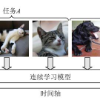Current evaluations of Continual Learning (CL) methods typically assume that there is no constraint on training time and computation. This is an unrealistic assumption for any real-world setting, which motivates us to propose: a practical real-time evaluation of continual learning, in which the stream does not wait for the model to complete training before revealing the next data for predictions. To do this, we evaluate current CL methods with respect to their computational costs. We conduct extensive experiments on CLOC, a large-scale dataset containing 39 million time-stamped images with geolocation labels. We show that a simple baseline outperforms state-of-the-art CL methods under this evaluation, questioning the applicability of existing methods in realistic settings. In addition, we explore various CL components commonly used in the literature, including memory sampling strategies and regularization approaches. We find that all considered methods fail to be competitive against our simple baseline. This surprisingly suggests that the majority of existing CL literature is tailored to a specific class of streams that is not practical. We hope that the evaluation we provide will be the first step towards a paradigm shift to consider the computational cost in the development of online continual learning methods.
翻译:当前持续学习(CL)方法的评估通常假定没有训练时间和计算的约束。这是一个不切实际的假设,不适用于任何真实世界的场景,这激发了我们提出:实时持续学习评估,流将不会等待模型完成训练,然后才公开新的数据进行预测。为此,我们从计算成本的角度评估当前的CL方法。我们在一个大型数据集CLOC上进行了广泛的实验证明,该数据集包含3900万个带有地理位置标签的时间戳图像。我们展示了一种简单的基线超过了这个评估方法下的最先进的CL方法,质疑了现有方法在实际情况下的适用性。此外,我们探讨了文献中常用的各种CL组件,包括记忆抽样策略和正则化方法。我们发现,所有考虑的方法都无法竞争我们的简单基线。这个结果让人惊讶,并暗示了大多数现有的持续学习文献是针对一个不实际的流类进行的。我们希望提供的评估将是在开发在线持续学习方法时考虑计算成本的范式转变的第一步。



